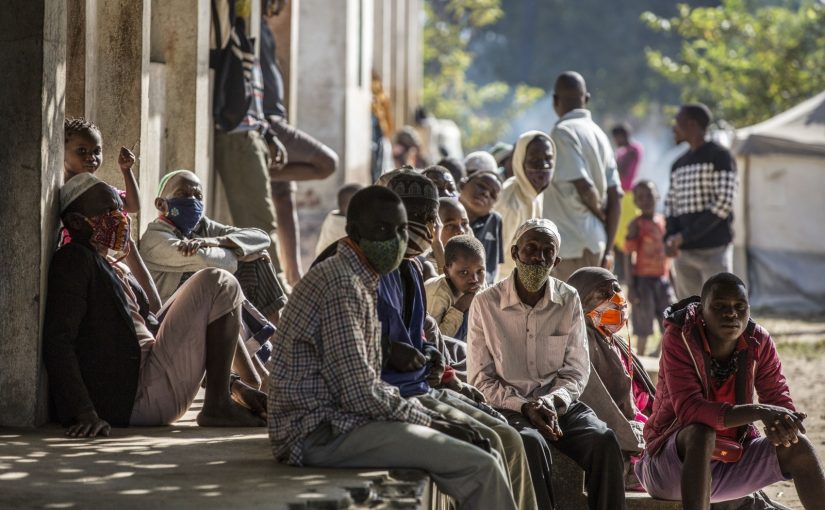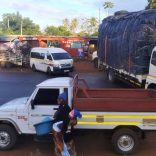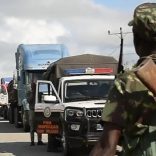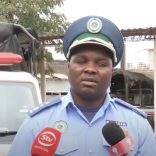Mozambique: Massinga toll blocked - Noticias report
Mozambique: US sees “fingerprints” of Islamic State in Cabo Delgado – Listen

File photo: Lusa
The commander of the U.S. Special Operations Command Africa said on Tuesday that the attacks in northern Mozambique have “Islamic State fingerprints”, expressing concern about the accelerating terrorist threat in the region.
“We are concerned. We do believe that there is a local issue there, a local grievance that is now being leveraged by Islamic State in particular. The reason we believe that is we have seen them over the last 12 to 18 months develop their capabilities, become more aggressive and use techniques and procedures that are common in other parts of the world in the Middle East, that are associated with the Islamic State,” Major General Dagvin Anderson said.
The commander of the United States Special Operations Command in Africa, based in Kelley Barracks in Stuttgart, Germany, was addressing a press conference on the United States’ efforts to combat terrorism in Africa during the Covid-19 pandemic.
Dagvin Anderson acknowledged that the Islamic State itself had claimed responsibility for some attacks, but said he saw signs of the terrorist organisation’s involvement in communications.
“We have seen media releases and media engagements that had been very well produced” and which “have the fingerprints and hallmarks of Islamic State,” he said. “So, we do believe that there is a deeper connection there. We believe that Islamic State is engaged with that faction in northern Mozambique, ISIS Mozambique, and that they are having influence. We don’t know to what extent. So we are still assessing that. We are working with our embassy there and the Government of Mozambique to look at what we can do to further assess and understand how that it’s developing and what it means to that region,” he said.
For Major-General Anderson, there is no doubt that “there are external actors” who are influencing “the conflict and “making it more virulent and more dangerous”.
“It is no longer just a local grievance that can be handled solely by local authorities. It has become something that has been inflamed by Islamic State, by Islamic State core that now provides them training, provides them education and provides them additional resources,” he said.
Dagvin Anderson underlined the concern about how the relationship between the local rebel movement and the Islamic State was developing, saying that the response would have to be led by Mozambique, but could involve other countries and the international community.
“Mozambique needs to take the lead on this” but “other countries in the region will need to engage,” he said. “Tanzania, Malawi and others will need to help because the terrorists know no borders. They will cross borders, they will engage, they will seek safe havens and refuge where they can in order to continue to disrupt the region,” he said.
On the other hand, he argued, the response to the threat must be not solely military, but most cover other issues, such as law enforcement and development, resolving the problems at the root of the challenge, and promoting economic development and opportunities.
“These are areas in which the US government has been engaged in and has been providing support to Mozambique,” he said, citing US aid to the country following the destruction caused by the 2019 cyclones as an example.
“This may not seem directly related, But we gave a lot of support t Mozambique after the typhoon [Kenneth] hit, he said. “.If we don’t provide that aid and assistance, if the international community doesn’t come together to help provide a way forward after these crises, the violent extremists will seek to exploit that. And they will seek to turn the populace away from the governments, and they will seek to provide an alternative narrative and an alternative means. All of these kinds of engagement come together in order to counter terrorism,” he said.
Asked by Lusa about the possibility of a United States military support in response to the conflict, Dagvin Anderson said that this would be the “last resort”.
“If you’re looking to us, as the military, that means that things have gotten very bad, in that it becomes closer to the last resort Governments need to come together to eliminate some of the underlying conditions, to provide opportunity provide economic development and to look at how e can go forward. Then, if required, then the military can come in and assist”
“Where we provide the better assistance is when we walk with our partners because these are very localised issues. Even with it’s al-Qaida or Islamic State that are involved, these are still localised issues and it requires the understanding and the nuance that the local government and the local forces bring”.
“So, for us, it means we need to engage with our partners, e need to provide them with additional capacity and build their ability to counter terrorism. Sometimes it’s education, to understand what those indicators are, sometimes it’s additional equipment and resources, sometimes it’s additional training,. But again, it’s dependent on the immediate environment and what can be tailored to that threat,” he said.
Thank you to all the journalists who participated in our briefing with @USSOCAF Commander from @USAfricaCommand on how U.S. partnerships with African nations to combat terrorists have become even more critical during COVID. Audio files available here: https://t.co/isd3DXqCzO pic.twitter.com/oniEXngZp4
— US Africa Media Hub (@AfricaMediaHub) August 4, 2020
Cabo Delgado has been the scene of actions by armed groups since October 2017, which, according to the United Nations, forced 250,000 people to flee from districts affected by the violence, further north of the province.
The armed conflict in the province has already killed at least 1,000 people.
The provincial capital, Pemba, has been the main refuge for people seeking shelter and safety in Cabo Delgado, but some prefer to flee to other places, including neighbouring provinces Niassa and Nampula.












Leave a Reply
Be the First to Comment!
You must be logged in to post a comment.
You must be logged in to post a comment.